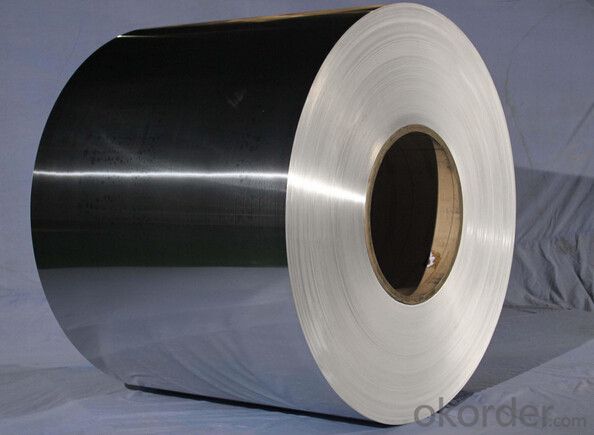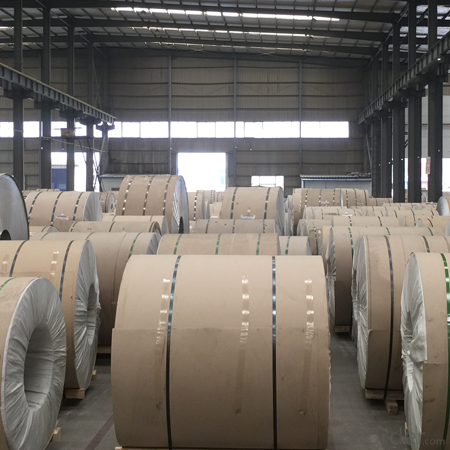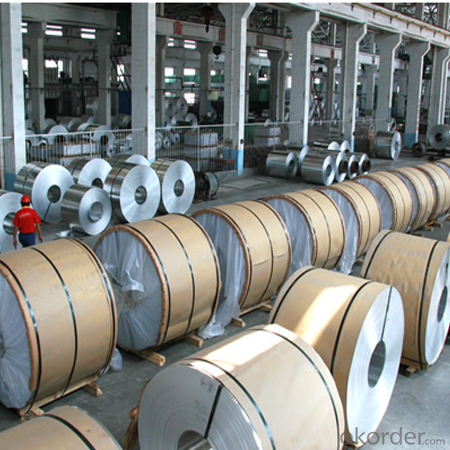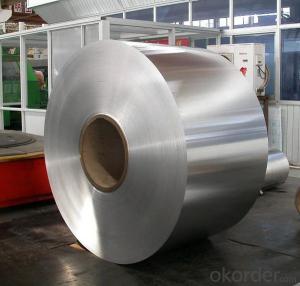AA1060 H12 Mill Finish Aluminum Coil China Supply
- Loading Port:
- Shanghai
- Payment Terms:
- TT OR LC
- Min Order Qty:
- 5 m.t.
- Supply Capability:
- 10000 m.t./month
OKorder Service Pledge
OKorder Financial Service
You Might Also Like
Item specifice
1. Specification of AA1060 H12 Mill Finish Aluminum Coil China Supply
Material | Alloy Aluminum 6063,6061,6005 or customer nominated |
Temper | T3, T4, T5, T6 |
Surface | Anodize, electrophoresis, powder coating, PVDF coating, wood grain painting, matted, etc. |
Colour | Any colour based on Standard Germany RAL Mark |
Length | Coating 6.5 meters, Anodizing 6.5 meters, Mill finish 5 meters |
Press Machine | 500-4000 tons all together 64 press lines. |
Fabrication | 1. Windows and doors; 2. Drilling; 3. Bending; 4. Cutting; 5. etc. |
Certificate | ISO 9001 |
Moulding | 1. Using our moulds, no fee; |
2. Using customer drawing, opening mould, usually about 10~50 tons then the moulding can be refunded. | |
3. Mould cost is negotiable base on the order quantity | |
Capability | Annual output 100,000 tons |
2. Application of AA1060 H12 Mill Finish Aluminum Coil China Supply
(1).Interior: wall cladding, ceilings, bathrooms, kitchens and balconies, shutters, doors...
(2).Exterior: wall cladding, facades, roofing, canopies, tunnels,column covers , renovations...
(3).Advertisement: display platforms, signboards, fascia, shop fronts...
3. Feature of AA1060 H12 Mill Finish Aluminum Coil China Supply
*Such coil is specially designed to replace aluminum ingot, due to the high export tax of aluminum ingot, the coil has better price than ingot.
*This type of coil can fit customer's remelting furnace just like ingot, no need to make any change to the production line that was previously used for ingot. The standard coil size and weight is very suitable for the feed gate of furnace.
*This type of coil causes less material wastage than ingot when remelted.
*Our coil is made directly from ore, no need to go though the ingot making process, quality is much better than other suppliers who use ingot scrap to make coil.
Be free from Oil Stain, Dent, Inclusion, Scratches, Stain, Oxide Dicoloration, Breaks, Corrosion, Roll Marks, Dirt Streaks and other defect which will interfere with use
4. Certificate:
SGS and ROHS(if client request, paid by client), MTC(plant provided), Certificate of Origin(FORM A, FORM E, CO), Bureau Veritas and SGS (if client request, paid by client), CIQS certificate
5. Image of AA1060 H12 Mill Finish Aluminum Coil China Supply



6. Package and shipping of AA1060 H12 Mill Finish Aluminum Coil China Supply
eye to wall
eye to the wall
with wood pallet (wooded case also available)
7. FAQ
1) What is the delivery time?
Dpends on actual order, around 20 to 35 days
2)What is the QC system:
We have QC staff of 20 persons and advanced equipment, each production is with MTC traced from Aluminum ingot lot.
3) What market do you mainly sell to?
Australia, America, Asia, Middle East, Western Europe, Africa etc
- Q:What are the common surface defects or issues in aluminum coils?
- Some common surface defects or issues that can be found in aluminum coils include: 1. Scratches: These are visible marks on the surface of the coil caused by contact with abrasive materials or improper handling during production, transportation, or storage. 2. Streaks: Streaks are long, narrow lines or bands that appear on the surface of the coil. They are often caused by irregularities in the rolling process or the presence of impurities in the aluminum material. 3. Dents: Dents are localized depressions or deformations on the surface of the coil. They can occur due to mishandling, accidental impacts, or improper storage practices. 4. Corrosion: Aluminum is generally resistant to corrosion, but certain environmental conditions or exposure to corrosive agents can lead to the formation of oxide layers or pitting on the surface of the coil. 5. Edge cracks: These are cracks or fissures that occur along the edges of the coil. They can be caused by improper cutting or shearing techniques during the manufacturing process. 6. Surface roughness: Surface roughness refers to an uneven or bumpy texture on the surface of the coil. It can be a result of inadequate smoothing or finishing during the rolling or processing stages. 7. Oil stains: Oil stains are dark or discolored areas that appear on the surface of the coil. They can occur due to improper cleaning or lubrication during the production process. 8. Coil set: Coil set refers to the tendency of the coil to retain a curvature or shape after unwinding. It can be caused by stresses induced during rolling, coiling, or cooling, leading to a non-flat and uneven surface. 9. Roll marks: Roll marks are patterns or imprints left on the surface of the coil by the rolling mill or equipment. They can be caused by uneven pressure or improper alignment of the rolling tools. 10. Discoloration: Discoloration refers to changes in the color or appearance of the aluminum surface. It can occur due to exposure to high temperatures, chemical reactions, or oxidation. These surface defects or issues can negatively impact the appearance, quality, and performance of aluminum coils. Manufacturers and users should be aware of these defects and take appropriate measures to prevent or minimize their occurrence.
- Q:I'm doing a science project on Aluminum and need to know what the other metals are in the following ores:BauxiteCryoliteGibbsiteI have to know what percentage of it is which metal. Don't know if that makes much sense, but I really need help because I can't find the answer anywhere. Thanks :D
- The bauxite is a sedimentary rock of chemical origin composed for the most part by alumina (Al2O3) and, in smaller measure, iron oxide and silica. It is the main aluminum source used by the industry. It is a residual taken place by the meteorización of the igneous rocks under conditions geomorfológicas and climatic favorable. Molecular formula: Na3AlF6 Synonym: Fluoroaluminato of sodium. Chemisorption of catechol on gibbsite, boehmite, and noncrystalline alumina... Alumina; Aluminium Oxyhydroxyde
- Q:Can aluminum coils be used for heat sinks?
- Yes, aluminum coils can be used for heat sinks.
- Q:What is the maximum coil weight for aluminum coils?
- The maximum weight of aluminum coils can differ due to several factors including coil thickness, width, and the specific alloy employed. Typically, the maximum weight for aluminum coils falls within the range of 5,000 to 25,000 pounds. Nevertheless, it is crucial to acknowledge that these figures are only approximate and may vary based on the manufacturer's guidelines and the capabilities of the equipment. Moreover, it is advisable to consult the manufacturer or supplier in order to ascertain the specific limitations on coil weight to guarantee safe handling and transportation.
- Q:Can aluminum coils be used in vacuum applications?
- Yes, aluminum coils can be used in vacuum applications. Aluminum is a commonly used material in vacuum systems due to its excellent properties such as low outgassing, high thermal conductivity, and good corrosion resistance. These properties make aluminum coils suitable for various vacuum applications, including but not limited to, vacuum chambers, vacuum pumps, cryogenic systems, and particle accelerators. However, it is important to note that aluminum can be reactive with certain gases or chemicals, so it is essential to consider the specific requirements and compatibility of the vacuum application before using aluminum coils.
- Q:What are the different coil annealing options available for aluminum coils?
- There are several coil annealing options available for aluminum coils, including batch annealing, continuous annealing, and stress relief annealing. Batch annealing involves heating the coils in a controlled atmosphere furnace and then allowing them to cool slowly. Continuous annealing, on the other hand, involves passing the coils through a series of induction or gas-fired heating zones with controlled cooling. Stress relief annealing is a process used to relieve internal stresses in the coils, typically performed at a lower temperature for a longer duration.
- Q:Are aluminum coils suitable for lightweight panel applications?
- Yes, aluminum coils are suitable for lightweight panel applications due to their inherent lightweight nature and high strength-to-weight ratio. Additionally, aluminum coils offer excellent corrosion resistance, making them a reliable choice for various lightweight panel applications.
- Q:hello, i'm doing a school project on aluminium and i'm a little stumped. what elements bond well with aluminium and why? thanks alot!
- Oxygen is another and AlO I believe is the most common bonded aluminum you will find.
- Q:Can aluminum coils be used in agricultural applications?
- Aluminum coils are suitable for agricultural applications. They offer numerous benefits for agricultural purposes due to their versatility and lightweight nature. In the agricultural industry, aluminum coils are commonly utilized in greenhouse frames, irrigation systems, and grain storage bins. The resistance to corrosion is one of the key advantages of aluminum coils in agricultural applications. Aluminum is naturally resistant to rust and can withstand exposure to moisture, chemicals, and other elements commonly found in agricultural environments. As a result, it is a durable and long-lasting choice for agricultural equipment that needs to endure harsh conditions. Moreover, aluminum coils have excellent thermal conductivity, allowing them to efficiently transfer heat. This property makes them ideal for heat exchangers, which are frequently used in agricultural machinery like tractors and combine harvesters. Efficient heat transfer helps maintain optimal operating temperatures and enhances overall equipment performance. Additionally, the lightweight nature of aluminum coils makes them easy to handle and transport. This is particularly advantageous in agricultural applications where equipment needs to be frequently moved, such as portable irrigation systems or lightweight structures. The lightweight nature of aluminum also aids in reducing fuel consumption in machinery, leading to cost savings and environmental benefits. Furthermore, aluminum is a non-toxic material, ensuring its safety in agricultural applications. It does not release any harmful chemicals or leach into the soil, thus keeping crops uncontaminated and safe for consumption. In conclusion, aluminum coils are a reliable and efficient choice for various agricultural equipment and structures. Their corrosion resistance, thermal conductivity, lightweight nature, and non-toxic properties contribute to increased productivity and sustainability in the agricultural industry.
- Q:Can aluminum coils be recycled?
- Indeed, it is possible to recycle aluminum coils. Due to its exceptional recyclability, aluminum stands as one of the frequently recycled materials. The procedure for recycling aluminum coils encompasses melting them to eliminate impurities and subsequently molding them into fresh products or coils. By recycling aluminum coils, not only are natural resources preserved, but also energy consumption and greenhouse gas emissions are diminished relative to the production of new aluminum from primary materials.
1. Manufacturer Overview |
|
|---|---|
| Location | |
| Year Established | |
| Annual Output Value | |
| Main Markets | |
| Company Certifications | |
2. Manufacturer Certificates |
|
|---|---|
| a) Certification Name | |
| Range | |
| Reference | |
| Validity Period | |
3. Manufacturer Capability |
|
|---|---|
| a)Trade Capacity | |
| Nearest Port | |
| Export Percentage | |
| No.of Employees in Trade Department | |
| Language Spoken: | |
| b)Factory Information | |
| Factory Size: | |
| No. of Production Lines | |
| Contract Manufacturing | |
| Product Price Range | |
Send your message to us
AA1060 H12 Mill Finish Aluminum Coil China Supply
- Loading Port:
- Shanghai
- Payment Terms:
- TT OR LC
- Min Order Qty:
- 5 m.t.
- Supply Capability:
- 10000 m.t./month
OKorder Service Pledge
OKorder Financial Service
Similar products
New products
Hot products
Hot Searches
Related keywords






























